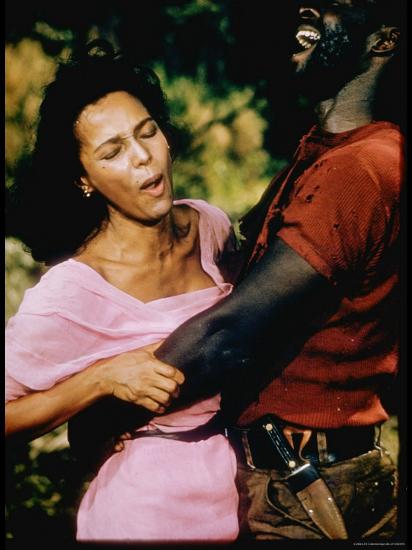According to Heyward, “It was the day set for the grand parade and picnic of “The Sons and Daughters of Repent Ye Saith the Lord,” and, with the first light of morning, Catfish Row had burst into a fever of preparation.” Expectations promise joy but turn topsy-turvy for Porgy and Bess.
When the steamer docks on Kittiwar Island, the Catfish Row crowd settles in the shade of palmettos. Many picnickers wander, but Porgy babysits the little ones while Bess searches for a palmetto leaf for a tablecloth. He sits with a large myrtle bush in one hand and brushes flies away from sleeping infants, humming. Soon he nods off.
Meanwhile, Bess is surprised by Crown, her former lover, who evades the law and hides on the island. Seeing Crown’s “great muscles” and “small, wicked eyes,” Bess is sexually aroused. So is Crown, who says, “I seen yuh land, an’ I been waitin’ fuh yuh.” Bess vainly tries to fight her passion. “I know yuh ain’t change,” he says, “Wid yuh an’ me it always goin’ tuh be de same. See?” With that, Crown grabs Bess, who inhales deeply and sends “a wild laugh out against the walls of the clearing.”
The picnic ends, and Bess returns just before the steamer departs for Charleston. Porgy knows something has happened and asks if Bess has seen Crown. After some hesitation, she answers truthfully and tells Porgy that Crown will come for her in October when the cotton comes to town. She is not penitent, and Porgy accepts his fate.
Featured Image: Dorothy Dandridge (Bess) and Brock Peters (Crown) in Otto Preminger’s Porgy and Bess (1959).
See Heyward, DuBose. Porgy. New York: George H. Doran Company, 1926; Heyward, DuBose and Dorothy Heyward. Porgy. Studio City, CA: Players Press, Inc., 1927. Reprint, 2005; George Gershwin and Dubose Heyward Porgy and Bess. Lyrics by Dubose Heyward and Ira Gershwin. New York, 1935; Otto Preminger. Porgy and Bess (1959). Screenplay by N. Richard Nash based on DuBose Heyward’s Porgy (1925) and DuBose Heyward and Dorothy Heyward’s play Porgy (1927), Trevor Nunn. Porgy and Bess (1986).

